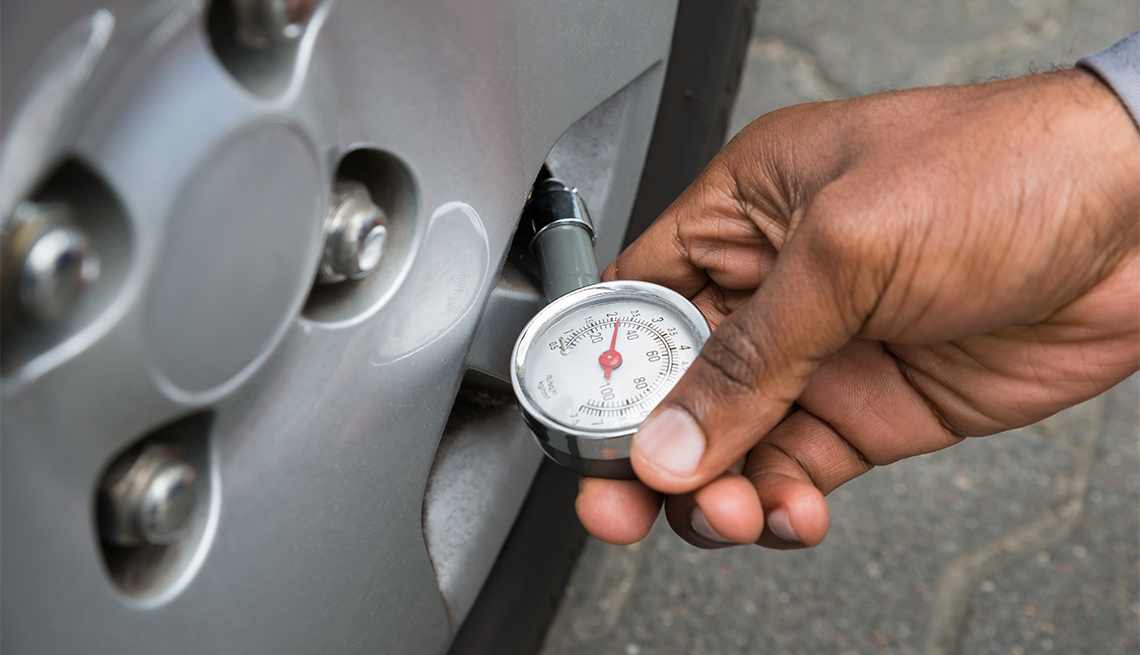Car Maintenance Tips to Take Before a Family Road Trip

Getty Images
En español | Since the Centers for Disease Control and Prevention confirmed that fully vaccinated people can travel safely within the United States this summer, there's been an uptick in road trips. AAA has projected that 43.6 million Americans will be traveling by road this season.
While it's important to keep your car well-maintained year-round, proper maintenance is especially crucial when you're planning a road trip. Nothing is less relaxing than having your vehicle break down when you're on vacation. AAA expects to receive 9.4 million calls for help from stranded motorists. If you don't want to be part of that statistic, it's time to get your vehicle road-trip ready.
Here's what you need to check or get checked by a mechanic before hitting the road.
1. Do a visual inspection, inside and out
"Everybody's getting ready for vacations or business trips, now that things are reopening. So we're getting a lot of maintenance questions," says Marc O'Dell, an Automotive Service Excellence-certified master mechanic in Helena, Montana, and an on-call car repair expert with JustAnswer, which connects professionals with people who need immediate online help.
JustAnswer is seeing about 20 percent more car questions for its auto mechanics this summer and expects to field 6,000 questions a week through Labor Day.
O'Dell suggests taking a good look at your car to see if anything needs attention. Inspect your wiper blades: If they're torn or brittle, replace them with a new set. Check that outside mirrors are in good working order, and look underneath the car to be sure there's no oil dripping out.
Get someone to help you test your turn signals, headlights, brake lights, hazard lights and bright lights. Turn on the ignition while your helper stands first in front of and then behind the car in order to confirm everything is functioning.
"Check if you hear any weird noises. If any warning lights come on, that could indicate a fuel system issue or that the fuel injectors are getting a little dirty," he says. "It's always a good idea to add some fuel injector cleaner to the gas tank before taking a road trip."
And at this time of year, make sure the air-conditioning works. Hot summer road trips are not exactly enjoyable when you're stuck in a car with no AC. So if you don't feel an icy breeze, have the system checked by a mechanic.
2. Examine the battery
Pop the hood and see if your car's battery terminals are coated with a white-, green- or blue-tinged substance. If so, that's corrosion, which can decrease the life of a battery and hamper a car's performance. To clean off the corrosion, disconnect the battery, sprinkle the terminals with baking soda and pour a small amount of water to dampen the baking soda. Once the solution bubbles, that means the baking soda has neutralized the corrosion, so it's safe to lightly scrub the terminals with an old toothbrush.
"You run into battery troubles with really cold temperatures and really hot temperatures, so keep an eye on yours," O'Dell says. "Have your garage run a quick load test on the battery to make sure it can recharge itself correctly and hold the charge."
3. Test the brakes
O'Dell suggests giving your brake pedal a good pump to test for responsiveness. If it feels spongy, you might need new brakes. Brake pads, which supply the friction required to slow and stop your car, wear away over time. So if you hear a screechy or squealing noise, your pads need replacing.

AndreyPopov / Getty Images
4. Check the tires
Tires are critical for car safety and fuel efficiency, so make sure yours are in road-worthy shape by checking for signs of wear on the side walls. Check that you have enough tread depth and enough tire pressure. You can find out how much air your tires need on the sticker located inside the driver's door, or in your owner's manual.
5. Top up fluids
In order to run properly, your car's six essential fluids — oil, radiator fluid, brake fluid, power steering fluid, transmission fluid and windshield fluid — must be checked and topped up regularly. Have your oil changed every three months or every 5,000 to 7,500 miles, and check it every time you fill up with gas during your road trip.
6. Replace the filters
Air filters prevent dirt, dust and insects from infiltrating the engine and the inside of your car. Clogged air filters decrease your engine's performance, gas mileage and interior air quality, so it's important to swap them out for clean ones at least once a year or every 10,000 miles. Cabin filters should be replaced every 12,000 miles.
7. Check belts and hoses
If you look under the hood and see significant damage on your serpentine belt — located beside your engine — it will need to be replaced, O'Dell says.
"Start checking the belt when the car is at 30,000 to 40,000 miles," he says. "You'll start to see little cracks in the rubber. And when you see enough of those cracks within an inch or so, I would replace it."
Check your hoses; if you see any fluid leaks, get them verified by a mechanic. Having a belt or a hose fail in the middle of a road trip could mean major engine trouble, leaving you without a car and with a hefty repair bill.
8. Don't leave tune-ups to the last minute
Most drivers stay on top of regular car maintenance, but some wait until right before they head out on a road trip. O'Dell suggests car owners develop a good relationship with a repair shop or mechanic to get a diagnosis and repair when needed.
"If it's just running a quick scan, checking why an engine light is on, that usually doesn't take very long," he notes.
Generally, if you've put 70,000 miles on your car since its last tune-up, it's time to get it checked by a mechanic. It's better to bring your vehicle in far enough in advance of your trip so that if something needs to be fixed, there's enough time to order replacement parts and complete work before you leave.
9. Bring along a few repair necessities
If your car does break down on the road, have some basic tools on hand, such as wrenches, pliers and screwdrivers, so you can make small repairs, O'Dell advises. He also suggests buying a Bluetooth code reader that connects to your phone to help diagnose any error messages that pop up.
"Get a small volt meter so you can check if the battery's charged up, and bring along a good set of jumper cables, too."
You might also want a small air compressor and a can of foam, like Fix-a-Flat, to patch a punctured tire, he adds.
Find out more information before venturing on your trip from JustAnswer's 11-step car inspection checklist for road trippers and from AAA's guide to preparing your car for summer travel.
Car Maintenance Tips to Take Before a Family Road Trip
Source: https://www.aarp.org/auto/car-maintenance-safety/info-2021/summer-road-trip-car-repair-tips.html
0 Response to "Car Maintenance Tips to Take Before a Family Road Trip"
Post a Comment